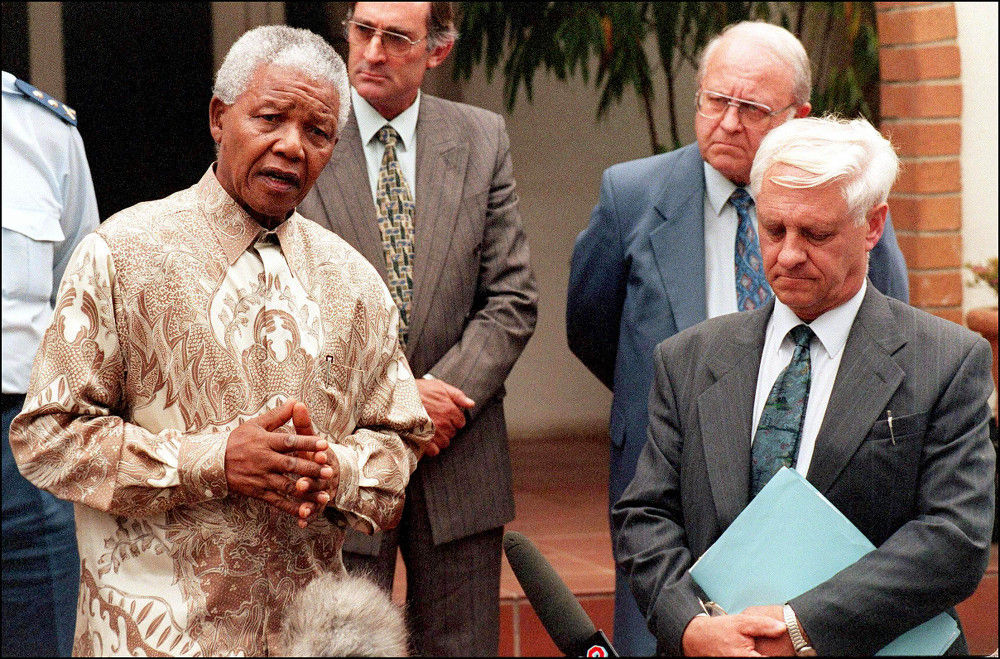General Constand Viljoen could have sabotaged the birth of the new South Africa but he was swayed by Nelson Mandela and formed the Afrikaner Freedom Front party instead.
The last of the Boer generals blames Nelson Mandela. Constand Viljoen says Mandela was the "bedevilling factor" in the negotiations in the run-up to the 1994 transition, a man who by sheer force of personality shaped the nature of the country.
And that is why, in his view, South Africa does not have (or perhaps does not yet have) an Afrikaner homeland – though that is not why the country is in poor shape.
"If what Mr Mandela began had been continued in the years after 1994 then we would have been in a good position," Viljoen says, with about as much respect as one human can muster for another.
Then his tone changes as his thoughts shift from 1994 to 2014. "I don't think we've ever gone into an election in such a political tangle as what is coming."
Coming from Viljoen, blame is, in many cases, praise; in the way that Mandela's influence prevented the formation of a Boer homeland, it also prevented the bloodshed that would almost inevitably have accompanied its birth.
History now unequivocally records that Viljoen, a former chief of the army and later of the defence force, the soldier's soldier who led from the front in Angola, could have fielded a force of about 50 000 men ready, even eager, to fight for Afrikaner self-determination.
They would have fought for a homeland, or simply to delay the transition and so force concessions from the black leaders-to-be, and the number of those who would have flocked to the banner would have varied accordingly. But this much is sure: Viljoen had his finger on the trigger but chose not to pull it.

(Walter Dhladhla, STF)
As a result, Afrikaners have no territory to call their own and Viljoen will watch the fortunes of the Freedom Front Plus – the direct descendant of the party he formed to contest the 1994 elections – from the farm to which he retired. There he works, still sprightly at 80, with few regrets about the choices made 20 years ago – but deeply worried about what the future holds.
In 1994, Viljoen says, there was hope, direction, ambition and, above all, leadership. Twenty years later, he sees little of any of them – especially leadership.
"We're sitting with a leadership drought. We don't have outstanding black leaders coming to the fore, nor white leaders or coloured leaders."
The country Viljoen sees is mired more deeply in race politics than ever, the polar opposite to the hopes of 1994. The ideals of Mandela "went to the grave with him", and democracy has become oppression by the majority, leaving no consensus on where the nation should head. Inefficient government machinery, affirmative action, labour running amok, a focus on higher pay rather than greater production and the lack of a work ethic has kneecapped the economy. The situation is, in a word, dire.
All of that could be fixed, perhaps, Viljoen concedes. Parliament, a body of which he was a member but found "disappointing", could find renewed purpose, maybe by a change to a constituency-based system of elections – but not in the absence of leadership with vision and high ethical standards.
Likewise, racial quotas in government, sport and the military could be replaced by a meritocracy, the expensive policy of peacekeeping on the African continent could be abandoned, and discussions such as the Convention for a Democratic South Africa could reignite both reconciliation and provide a socioeconomic road map – but not without willing and able leaders.
It is against that backdrop that Viljoen can imagine a new drive for Afrikaner self-determination, if there was greater cohesion among Afrikaners and high-calibre young leaders at the forefront – neither of which are apparent. Unless things get better fast, though, those preconditions could be met, and a shadow of what was contemplated in 1994 could come into being, though cultural rather than geographic.
"The problem with a volkstaat is the spread of Afrikaners within South Africa. You can't easily cordon off an area where there are only Afrikaners and, to tell you the truth, I don't think Afrikaners would move for that."
There are, however, ways and means to soften the effects of one person, one vote: control over schools and institutions of higher learning, for starters, and strong cultural organisations. These could stem the rapid waning of cohesion that Viljoen fears will soon become terminal; they could regroup Afrikaners into a political bloc rather than, in effect, a political nonentity.
Does he believe such a turnaround, a reversal of the impact Mandela had in convincing Afrikaners that self-determination was not necessary, is likely? Not really. But he fears the alternative.
He recently read a book by a Mozambican freedom fighter, Viljoen says. The book itself is, at best, average but an idea in the foreword grabbed his attention. What if, the author argues, Southern Africa had decided in the 1960s not to fight the Cold War as proxies for the contesting superpowers? What if white South Africa had spent money on infrastructure rather than warding off communism, and what if African nationalism in bordering countries had not been hitched to the wagon of the Union of Soviet Socialist Republics? What might have been?
"Today we are suffering the results of a lack of vision in 1960," Viljoen says. "We need to make sure we aren't suffering 20 years from now because of a lack of vision today."